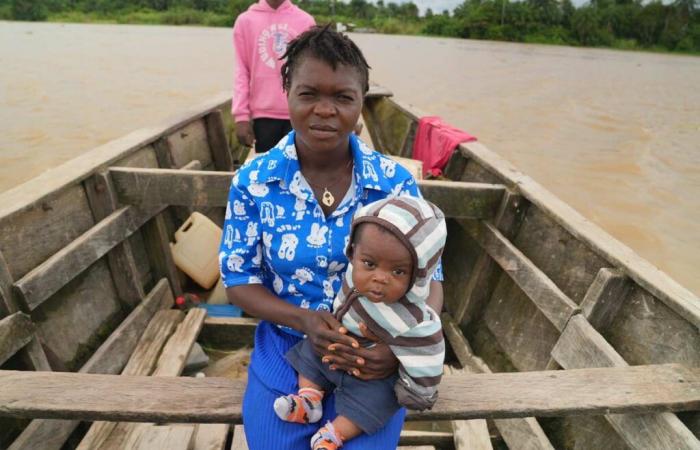Aina Ogundare held her crying three-year-old child Tunmise tightly as she waited to see a doctor at Ikorodu General Hospital on Wednesday morning.
Visibly worried and agitated, the 34-year-old young woman was surrounded by dozens of other women who had braved torrential rains to besiege this Lagos hospital in search of medical care for their loved ones. Laboratory test results confirmed that the little girl had malaria.
“I can’t afford to lose her. I will do everything I can to help her overcome this illness,” the young mother said as a nurse tried to calm her fears.
Aina has valid reasons to express such concern. Four years ago, she lost her then only child, Ayomide, to malaria.
Although the arrival of Tunmise helped lessen the impact of this loss, the constant threat posed by malaria ensured that the shadow of this tragedy continued to loom large.
“I can’t count the number of times my baby has fallen ill with malaria,” Aina Ogundare told VaccinesWork as she exited one of the three consultation rooms on the ground floor of the hospital.
“The situation has exhausted our resources and taken a heavy mental toll on us,” she added, before going to the clinic to buy the medicine prescribed for her daughter.
Kelechi Ukatu, a single mother of twins, also knows the pain and nightmare associated with malaria. Since giving birth to her children, the parasitic disease has allowed her to sleep very little. Day and night, at different times, malaria infected her boys, leaving her with a heavy burden.
In addition to spending resources on purchasing treatment every time they fall ill with malaria, the psychological trauma that comes with it can be devastating.
“There were times when we had to wake up in the middle of the night to take the children to the hospital because of malaria. We frequently go to different hospitals because of this situation,” says Kelechi Ukatu.
The impact of conflicts
In other parts of Nigeria, particularly in the northeast region, where conflicts have undermined communities and forced families into camps, the threat and danger posed by malaria remains real and serious.
In Borno, one of the six states in the region and the epicenter of the insurgency which has caused a real humanitarian crisis, malaria spares no one. People young and old were left to deal with a merciless killer.
“My neighbors lost a child to malaria in September after floods hit our community,” recalls Aisha Aliyu, a mother of one living in Maiduguri, the Borno state capital.
“Less than a week later, my son, Ali, also caught the same disease. I was confused and afraid of losing him.
“Although he is now cured, he is no longer the same child, especially since we do not have a treated mosquito net to protect him from mosquitoes,” she added in an interview with VaccinesWork.
Fatima Hassan, who also lives in the same town with her daughters, lost a nephew to malaria two years ago. Following an increase in the number of malaria cases in her neighborhood since September, after floodwaters from a collapsed dam overflowed into parts of the area, she worries for the safety of her daughters.
“I can’t count the number of times my baby has fallen ill with malaria. »
– Aina Ogundare, mother
“The threat of malaria in this part of the country has increased over the last two months. The situation has exposed our children to illness, and it greatly affects our lives.
We hope that the authorities will do something soon to resolve this problem, before we lose more lives to malaria,” she said.
The burden of malaria in Nigeria
Saliu Ibrahim, a doctor in Kebbi, the state with the highest malaria prevalence in the country, said almost eight out of ten cases treated at the government facility where he works are malaria-related. He fears the worst if urgent measures are not taken to remedy the situation.
“As medical staff, we are overwhelmed by the number of malaria cases we treat every day. The number of victims linked to these diseases makes this a serious crisis which must be quickly examined by the authorities,” he said.
The leading cause of death among children under five and pregnant women in Nigeria, malaria continues to wreak havoc across the country, inflicting wounds on families and entire communities that may never fully heal.
“Malaria hampers productivity and slows down the national economy due to people getting sick and dying. Therefore, the losses suffered each year due to this disease are certainly greater than what is reported.”
– Peter Agadibe, consultant pharmacist based in Lagos
The WHO World Malaria Report 2023 indicates that Nigeria accounted for 27% of the global malaria burden – the highest figure in the world – with a national prevalence rate of 22% among children aged five and under. In the northeast region, this figure reaches 49%.
Transmitted to humans by female Anopheles mosquitoes, malaria is a common year-round phenomenon in the country, particularly during the rainy season when flooding favors the spread of the disease within communities. Health authorities have estimated the economic burden of the disease on Nigeria at US$1.6 billion per year, noting that this amount could reach US$2.8 billion by 2030. But experts estimate that the cost is, in fact, higher when considering the direct impact on people and households.
“Malaria hampers productivity and slows down the national economy due to people getting sick and dying. Therefore, the losses incurred annually from this disease are certainly greater than what is reported,” said Peter Agadibe, a Lagos-based consultant pharmacist.
Professor of Pediatrics and strategic advisor to the Nigerian Minister of Health for malaria elimination, Olugbenga Mokuolu identified insufficient funding, weakness in the health system including workforce exhaustion, Insecurity, environmental challenges and behavioral patterns as some of the factors responsible for the malaria crisis in the country.
“My second child often suffered from malaria and, unfortunately, I did not know about it in time until she passed away. My baby is five months old now, and I would like to vaccinate him to protect him. »
– Permanent Epiere, mother of two children in the community of Onuebum
“We have problems with insecticide resistance, behavioral problems related to inadequate use of available bed nets, poor diagnosis and poor treatment practices. Although we have made progress in the fight against malaria, the challenge is that at any given time, the resources deployed are only a fraction of what is needed.
The problem requires a multi-sectoral response, resource mobilization and innovative approaches to improve access to prevention and treatment tools,” he said.
Vaccines are coming
In October 2024, the Nigerian government received its first shipment of malaria vaccines. Designed to reinforce interventions already implemented, such as the distribution of insecticide-treated mosquito nets to families, the vaccines will soon be rolled out in Kebbi and Bayelsa states. More than 800,000 doses are expected to be distributed during this initial phase.
Nigeria’s Minister of Health and Social Welfare, Professor Ali Pate, said the arrival of the malaria vaccine was a major milestone in the country’s efforts to reduce malaria cases and deaths. are linked to it.
“With the support of UNICEF, Gavi and WHO, we are on the path to achieving our goal of a malaria-free Nigeria,” he said on the occasion.
While the arrival of the preventative vaccine has brought some relief and hope to parents in some parts of the country, in Bayelsa, one of the two states where the first rollout will take place this month, some mothers reportedly wished that the vaccine arrived earlier.
“My second child often suffered from malaria and, unfortunately, I did not know about it in time until she passed away. My baby is five months old now, and I would like to vaccinate him to protect him. The vaccine will be very useful to us because many children are dying due to malaria,” Permanent Epiere, a mother of two from Onuelum community, Ogbia council area of the state, told VaccinesWork.
Professor Olugbenga Mokuolu sees a glimmer of hope with the arrival of the new vaccine. He believes the rollout planned for the end of this month will lead to fewer hospital visits for children and increased survival rates for those in the most at-risk age group.
“The malaria vaccine offers a huge opportunity as an additional tool in the fight against malaria,” he said.






